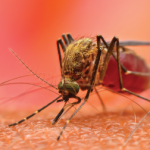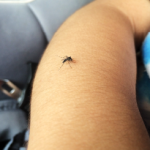Polyarthritis is reported in 87–98% of cases, typically seen two to five days after onset of fever. They are commonly symmetrical (64–73%), with pain and swelling involving distal small joints such as those of the hands, wrists and ankles. Involvement of the axial skeleton was noted in 34–52% of cases.8,23,24 Often, the arthritis is severe and debilitating, leading to immobilization due to pain. The subsequent phase of persistent arthritis/arthralgias is unique with Chikungunya. This phase is characterized by morning stiffness, persistent joint pain and swelling, which may last for months to years. One study from South Africa reports arthritis occurring eight years after the acute illness.25 The number of individuals with persistent joint symptoms decreases with time.
These symptoms mimic rheumatoid arthritis (RA), and case reports from the Reunion Island outbreak have reported 21 patients fulfilling the American College of Rheumatology (ACR) criteria for RA.26 Another study from India showed 36% (34/94) met the ACR criteria for RA, of whom only one individual tested positive for anticyclic citrullinated peptide.27 Tenosynovitis is another commonly described feature.28 Lymphopenia and moderate thrombocytopenia are observed on laboratory tests. An elevated sedimentation rate or C-reactive protein is not frequently seen. A small number of cases from India, as well as the Reunion Islands, has documented radiographic erosions on magnetic resonance imaging during the persistent arthritic phase.27,28
Can Chikungunya Infection Be Fatal?
Severe complications and death are reported among patients older than 65 years, infants and in those with other underlying co-morbid illnesses. A case–fatality ratio of about 1:1,000 was documented from the Reunion Islands.29 Uveitis, myocarditis, hepatitis, nephritis, meningoencephalitis, Guillain-Barré syndrome and cranial nerve palsies have also been reported with Chikungunya infection.6,8,30,31 Thus, chances for severe complications are higher in immunocompromised individuals. There has not been any clear report about Chikungunya in immunosuppressed individuals, but it would be concerning in those who are on immunosuppressive treatment. In utero transmission has been documented, mostly during the second trimester, as well as intrapartum transmission. In a case report from the Reunion Islands, severe illness was observed in 53% of newborns and mainly consisted of encephalopathy with persistent disabilities in 44% of them.32
How to Diagnose Chikungunya?
The primary diagnostic tool is testing for IgM anti-Chikungunya virus antibodies (by enzyme-linked immunosorbent assay [ELISA]). They are detected in the serum starting about four days following onset of symptoms. IgG antibodies are detected after about two weeks and may persist for years. CHIKV diagnostic testing in the U.S. is primarily only performed by the Centers for Disease Control and Prevention (CDC). Testing for these antibodies is not very specific, and cross-reactivity with other alphaviruses has been noted. Reverse-transcription polymerase chain reaction (RT-PCR) can be used as a diagnostic tool during the initial viremic phase (≤8 days). Viral cultures are used as a research tool and may detect the virus in the first three days of illness. CHIKV has been isolated from biopsies of skeletal muscles, synovial tissue and skin, and has also been found in perivascular synovial macrophages.33
Treatment
There has not been much evidence-based research regarding treatment of Chikungunya-related arthritis. The mainstay of treatment in the acute phase is supportive measures with fluids and antiinflammatory agents (nonsteroidal antiinflammatory drugs [NSAIDs]). Some drugs were found to be effective against CHIKV when tested in vitro, but no antiviral agents have been shown to be effective in human infections.34 There has been documentation of persistence of the virus in nonhuman primates weeks after infection,35 and thus, the use of immunosuppressive agents would not be advised. There are also reports of strong rebound arthritis when corticosteroid treatment is stopped.6


